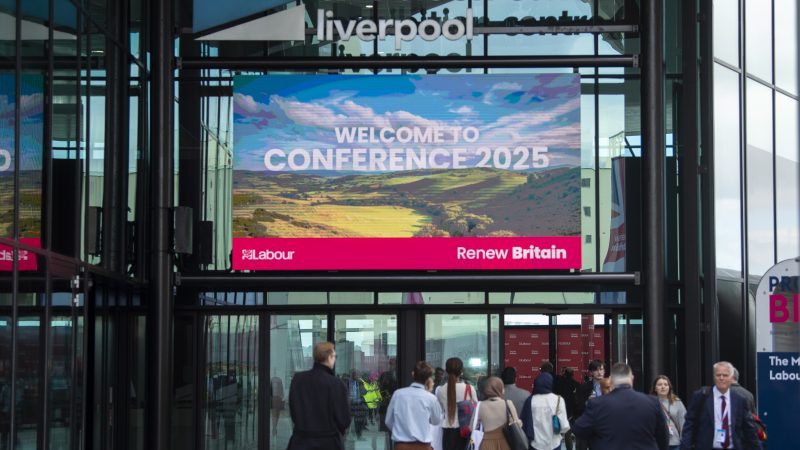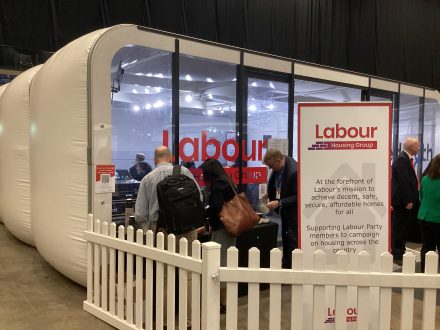
Conference doesn’t end when the hall empties.
Many attendees who spill out onto Liverpool’s waterfront make for bars, restaurants and pubs, debating, drinking and dancing for hours with friends old and new.
Member Andy Behan is gutted he missed out. Instead he left early each day, spending his evenings alone on trains home to Manchester.
The Liverpool apartment he’d reserved a year ago was unexpectedly cancelled in August. Even for a single room, costs city-wide had soared between twofold and fivefold on his previous booking.
“It’s getting ridiculous. It ruined my conference,” the former rail worker said.
LabourList spoke to multiple organisations and individuals alarmed by the ever-rising cost of conference, with some warning it risks “disenfranchising” working-class, disabled and women members less likely to be able to afford it. One attendee slept in their car.
Several Labour-linked groups revealed they were priced out of hosting events altogether, with subsidies reportedly cut.
But conference leaves party officials with unenviable trade-offs too between competing needs for inclusivity and campaign fundraising. For many attendees, the benefits remain priceless.
READ MORE: Phillipson hits out at Powell, warning against deputy leader ‘with no clout’
Hotels charging £500 a night and members sleeping in cars

Alexander Parker decided to attend last minute after being selected to run as a councillor, but hotels were so expensive, he slept in his car. “My holiday savings wouldn’t stretch that far.”
Alan Bullion, a town councillor, said he paid £1300 for a “bog standard hotel” – double average monthly rents in Liverpool.
Other members said they knew attendees renting caravans, rooms a 40-minute bus ride away or accommodation as far as Manchester. “People were completely priced out of the 30-minute walk radius,” one complained.
A union source singled out Trust Reservations for criticism, the party’s official booking partner. It helps the party negotiate and block book city rooms, but LabourList analysis underlines why many will share his view guests pay “over the odds”.
Prices already for next year’s conference average £365 a night across 16 hotels on Trust Reservations’ site. Three charge over £500. By contrast, prices a week earlier average £130.
Trust Reservations said it could not comment on client details. Labour did not respond to multiple requests for comment for this piece.
READ MORE: Half-way point in rail nationalisation as Greater Anglia returns to public hands
Barriers to working-class, disabled and female members

“It risks disenfranchising lots of people if they don’t tackle this,” said Emily Pomroy-Smith, a member of Disability Labour’s committee.
She said “spiralling costs are a barrier” to attendees from working-class backgrounds, aspiring delegates from less well-resourced CLPs, and disabled members more likely to be in poverty.
She said cost factored into some CLPs not sending delegates, and noted attendees with mobility or sight issues are more likely to need closer and therefore pricier accommodation.
Ellen Morrison-Smith, disabled members representative on Labour’s ruling body, highlighted a “wider issue of disabled members not getting to conference”, with past access problems and a likely fall in membership over welfare reform also impacting attendance.
One senior woman in the party said conference’s cost and length posed particular challenges for women too, who disproportionately have care commitments that mean “additional costs and calculations”.
“There needs to be recognition costs restrict accessibility and inclusivity.”
Women’s conference was also cancelled after many guests had booked accommodation and travel.
Another senior woman said they heard “costs and childcare” even contributed to some MPs not attending.
READ MORE: Darren Jones on his new role, the morning school run and his political awakening
No Disability Labour events despite welfare battles
Costs are a major hurdle for organisations too, deterring several Labour-linked groups from hosting events or stands at all.
Rooms can cost thousands for a two-hour slot in official or even nearby venues. One organisation claimed the cost of booking one space for the whole conference leapt by more than £10,000.
On top of accommodation, travel and food, organisers in the ‘secure zone’ face extra costs for microphones and speakers (£450-650), magazine and app advertising (£265-760) and catering. This year’s magazine was also ditched post-reshuffle, meaning some organisers wasted £170 per listing. Organisers receive some free passes, but further ones cost up to £145 for members, up to £1293 for third sector attendees and £2,945 for commercial ones. Business Day passes were reportedly hiked 66% to £5,000 a head.
The party’s affiliated body for disabled members went without its usual stand and fringe event – after the party reportedly slashed past subsidies for some Labour groups.
“It’s disappointing not to be there in full capacity. We don’t charge members and don’t have huge coffers,” said Pomroy-Smith.
She said Disability Labour’s presence was “particularly important” given ministers’ pledge to co-produce revised welfare reforms with disabled people, while the stand was previously a “hub” helping attendees with access.
‘No recognition’ for socialist societies
It was great to see everyone at our annual Labour Conference Socialist Societies reception!
Thank you to our brilliant speakers @mrs_creynolds, @LiamConlon2 and our SocSoc representatives.
Join a Labour affiliated Society today: https://t.co/65jZjKAJDn pic.twitter.com/BjKXIwHmiW
— Socialist Societies (@SocialistSocs) October 1, 2025
A member of one affiliate said reduced support for affiliates was a “real shame”, with “no recognition for us versus other organisations”.
Cost factored into the Socialist Societies not hosting a joint promotional stand, either, though they held a rally.
Meanwhile Scientists for Labour abandoned hope of panels on AI regulation and quantum after realising hosting would cost “an entire year of membership subs”.
Chair Johnathan Guy said it was “very tricky” for smaller societies to host events, despite their likely “useful input” into key debates. “There’s lots of science events, but the science affiliate isn’t able to be part of those conversations, even though our membership are experts.”
Venue costs were likewise “prohibitive” for the Socialist Education Association, according to general secretary James Whiting.
Costs ‘increasingly hard to justify’
Many organisations now “wince” at costs, and “find it harder to justify to their members”, according to one union source. An affiliate member suggested they were increasingly “mindful” evaluating whether attending is actually worth spending limited funds on.
Potential sponsors also felt “less engaged”, securing ministers was “significantly harder” and income fell for one event organiser, who noted sponsorship’s role enabling non-profits to host events and raise wider funds.
They warned their programme was unsustainable next year without price cuts. “We’ll lose money.”
Subscribe here to our daily newsletter roundup of Labour news, analysis and comment– and follow us on Bluesky, WhatsApp, X and Facebook.
Companies fill the gap
Costs didn’t stop this conference smashing attendance records again, however.
Yet Morrison-Smith noted that includes all visitors, not just supporters. Politico reported widespread perceptions of a “more corporate feel”, with “loads of suits, not many anoraks”.
“If you’re prioritising organisations with money, you get a certain type of discourse,” one left activist told LabourList.
How much conference generates Labour is unclear, but the number of official fringe events rose to over 700. Party records indicate 2023 generated £1.7m, and 2024 was “highly successful” with above-expected income and commercial attendance and record exhibitors.
But Labour desperately needs funds
One union source condemned conference as a “money-making exercise”.
But Pomroy-Smith, Guy and other Labour figures said they sympathised with the party’s fundraising imperative.
Labour fell £3.8m short of covering election and wider costs last year, and LabourList recently revealed officials expect a deficit this year too despite curbs on pay and recruitment. £4m is reportedly needed to cover 2026 elections. Meanwhile donations have fallen, and official funding for opposition parties worth around £7m has ceased.
Treasury Mike Payne told conference the party must “control our expenditure” and build financial resilience. “When our finances are strong, our campaigns are strong.”
One veteran of conference organising said: “No-one’s getting ripped off, and it was profitable even in the Corbyn years. It’s more corporate as we’re in government.”
They also defended CLPs reducing delegate numbers, criticising the “massive delegations” some sent in previous years.
As for some activists’ suspicion Liverpool’s monopoly is driving inflation, they noted few other venues nationally are now big, secure and accessible enough to host conference – and that it helps Merseyside’s deprived economy too, reportedly yielding £30m.
‘My car park spot cost £18 a night’

They noted corporate interest also gave Labour organisations looking to host events greater sponsorship opportunities.
Several organisers and attendees found other ways to make conference affordable.
The TSSA funded Disability Labour reps’ attendance as delegates, while one Labour group called the unions more widely a “massive help” funding free venue space. “Without them, lots of grassroots, low-money Labour campaigns would be frozen out.”
The majority of Labour affiliates did manage to organise events.
Labour Housing Group chair Jack Shaw said it managed its biggest programme yet, put down to volunteers’ “tenacity” and experience, with events boosting not only its and the party’s coffers, but its profile and membership too.
As for individuals, aspiring councillor Lucy Shaw said advance planning and flat-sharing meant she only paid £90 a night. The whole event remains “way more affordable than typical private sector conferences”, and she noted some events had free food and drink.
Parker said the parking spot for the car he slept in was just £18 a night, and all in, conference only cost him £215. “It saved a fortune. Yes I was roughing it, but I slept well when I got home.”
Are the benefits still priceless?
 For all the costs, many organisations and activists are clear conference remains worth it.
For all the costs, many organisations and activists are clear conference remains worth it.
Parker attended 39 events. “I loved the experience.”
First-time attendee Lucy Shaw said: “For the experience, density of connections, progress on many different policy ideas, and quality time with my CLP group, it was exceptionally good value.”
One event organiser said it “can’t be matched for guests, speakers and rapid-fire meetings”, adding: “It’s incredible. There’s nothing else like it.”
Share your thoughts. Contribute on this story or tell your own by writing to our Editor. The best letters every week will be published on the site. Find out how to get your letter published.
-
- SHARE: If you have anything to share that we should be looking into or publishing about this story – or any other topic involving Labour– contact us (strictly anonymously if you wish) at [email protected].
- SUBSCRIBE: Sign up to LabourList’s morning email here for the best briefing on everything Labour, every weekday morning.
- DONATE: If you value our work, please chip in a few pounds a week and become one of our supporters, helping sustain and expand our coverage.
- PARTNER: If you or your organisation might be interested in partnering with us on sponsored events or projects, email [email protected].
- ADVERTISE: If your organisation would like to advertise or run sponsored pieces on LabourList‘s daily newsletter or website, contact our exclusive ad partners Total Politics at [email protected].




More from LabourList
‘Council Tax shouldn’t punish those who have the least or those we owe the most’
Two-thirds of Labour members say government has made too many policy U-turns, poll reveals
‘Two states, one future: five steps on the path to peace for Israelis and Palestinians’